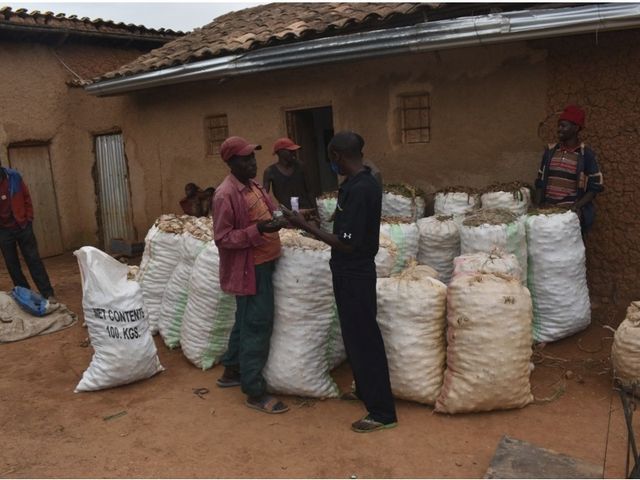Vedaste Ntibizerwa, a 43-year-old father of 5 children, lives in Cyuna cell, Rusenge Sector of Nyaruguru District. He testified how the SMART project empowered his family and enabled him to expand his income.
Ntibizerwa said that before being a SMART project beneficiary, he used to farm on a land of 0.6 hectares to plant different crops such as sweet potatoes, beans, cassava, and sorghum. But Ntibizerwa got poor yield, and he could not feed his family.
The SMART project started by terracing the lands, distributing inputs, and supporting farmers with new skills in good agricultural practices and postharvest handling and storage practices of Irish potatoes through training, which allowed farmers to get good yields in quantity and quality. Farmers also got formal markets for their produce. “I managed to sell 1700 kg at 190Rwf/kg and earned 323,000 Rwf. From this money, I bought a calf for 250,000 Rwf and a goat for 30,000 Rwf. These livestock help me to earn money through selling their offspring and manure to improve my farming activities”, said Ntibizerwa.
Ntibizerwa declared that he could not improve his household welfare without SMART project interventions. “I couldn’t have any possibility to improve my family life without support from the SMART project interventions. It was my dream to have livestock, but I had no means to afford it”, he expressed.
Today, Ntibizerwa has enough fodder on his terraces to feed his cow, and he gets enough organic manure for farming.
The United Nations World Food Programme (WFP) and the government of the Republic of Korea through the Korea International Cooperation Agency (KOICA) launched the “Sustainable Market Alliance and Assets Creation for Resilient Communities and Gender Transformation (SMART) Project” in Rwanda.
The SMART project builds on best practices from Korea’s rural development model, the Government of Rwanda’s Vision Umurenge Programme (VUP), and WFP’s asset creation and smallholder farmer market support model to improve household food security and enhance community resilience. The project is aligned with the Government of Rwanda’s National Strategy for Transformation (NST, 2017–2024). It also aligns with the Ministry of Agriculture and Animal Resource’s (MINAGRI) Strategic Plan for Agriculture Transformation 2018 – 2024 as well as the Social Protection Sector Strategic Plan 2018/2019 -2023/2024.
The SMART project implementation is carried out by RWARRI and RDO.
